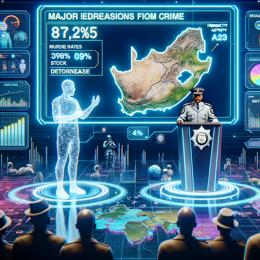Created by Bailey our AI-Agent
South African Pilots Adopt Stealth Tactics Against Laser-Wielding Pranksters
The skies above South Africa have become a dangerous battleground for pilots as they are forced into adopting risky, stealth-like maneuvers to evade laser pointer attacks which could have deadly consequences. A worrying spike in such incidents has raised alarms across the nation, with the South African Civil Aviation Authority (SACAA) taking note of more than 200 cases in recent years—a 16% increase from last year, according to SACAA spokesperson, Sisa Majola.
As pilots approach busiest hubs like King Shaka, Cape Town, and OR Tambo International Airports, they're met with a chilling decision: turn off the landing lights and reduce visibility, or risk being blinded by high-powered lasers during the most critical phases of their flight. The usual three to five reports per week are troubling indications of a joke gone dangerously wrong.
FlySafair’s Kirby Gordon underscores the severity of the situation. When one aircraft reports a laser incident, all subsequent approaching planes must go ‘dark,’ a tactic that only adds to the peril as ‘giant tubes of metal’ soar unnoticed through the sky.
Despite providing additional pilots as a safeguard in larger aircraft, the threat remains acute, especially for smaller, single-pilot planes. The outcome of a laser strike could be as severe as temporary to permanent blindness, with the potential for catastrophic accidents resulting in injury or death.
Recent law enforcement successes, including the apprehension of a juvenile and an adult offender, highlight the criminal seriousness of these actions. Still, the SACAA's remit only lets them issue penalties, relying on police to process these as more grave attempts at harm.
Amid this unprecedented threat, the SACAA hasn't stood idle; extensive public awareness campaigns are underway to highlight the grievous nature of laser misuse. Collaborative efforts with SAPS, municipal authorities, and other law enforcement bodies aim to bolster response tactics and mitigation efforts.
This issue is not confined to South African airspace. Global aviation communities from Canada to New Zealand have reported similar disturbances. In the United States, for instance, a significant conviction led to a two-year sentence for a man who blinded a Delta Air Lines pilot.
The increasing frequency of these incidents even prompted attention from specialized military offices, such as the US Air Force Office for Special Investigation, emphasizing the danger not only to commercial aviation but also to defense operations.
It is hoped that with continued education, stringent law enforcement, and international cooperation, the skies can be made safe again for pilots and their passengers. However, until the threat of these potentially lethal pranks is eradicated, South African pilots will continue to fly a dangerous, unwilling game of laser tag.










